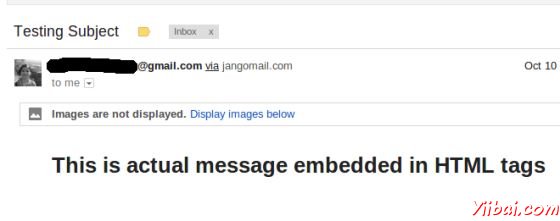JavaMail API 傳送一個HTML電子郵件
下面是一個例子,從你的機器傳送HTML格式電子郵件。這裡通過使用JangoSMPT伺服器的郵件傳送到我們的目標電子郵件地址。
這個例子非常相似,傳送簡單的電子郵件,除非,這裡我們使用的是使用setContent()方法來設定內容的第二個引數為“"text/html"指定的HTML內容被包含在訊息中。通過這個例子,你可以傳送喜歡HTML內容。
傳送包含HTML內容的電子郵件,遵循的步驟是:
-
獲得一個Session
-
建立一個預設的MimeMessage物件,並設定發件人,收件人,主題(From, To, Subject)在訊息中。
-
設定使用使用setContent(實際的訊息),如下方法:
message.setContent("<h1>This is actual message embedded in HTML tags</h1>", "text/html");
-
傳送使用傳輸物件的訊息。
建立Java類
建立一個Java類檔案SendHTMLEmail,是其內容如下:
package com.yiibai; import java.util.Properties; import javax.mail.Message; import javax.mail.MessagingException; import javax.mail.PasswordAuthentication; import javax.mail.Session; import javax.mail.Transport; import javax.mail.internet.InternetAddress; import javax.mail.internet.MimeMessage; public class SendHTMLEmail { public static void main(String[] args) { // Recipient's email ID needs to be mentioned. String to = "[email protected]"; // Sender's email ID needs to be mentioned String from = "[email protected]"; final String username = "manishaspatil";//change accordingly final String password = "******";//change accordingly // Assuming you are sending email through relay.jangosmtp.net String host = "relay.jangosmtp.net"; Properties props = new Properties(); props.put("mail.smtp.auth", "true"); props.put("mail.smtp.starttls.enable", "true"); props.put("mail.smtp.host", host); props.put("mail.smtp.port", "25"); // Get the Session object. Session session = Session.getInstance(props, new javax.mail.Authenticator() { protected PasswordAuthentication getPasswordAuthentication() { return new PasswordAuthentication(username, password); } }); try { // Create a default MimeMessage object. Message message = new MimeMessage(session); // Set From: header field of the header. message.setFrom(new InternetAddress(from)); // Set To: header field of the header. message.setRecipients(Message.RecipientType.TO, InternetAddress.parse(to)); // Set Subject: header field message.setSubject("Testing Subject"); // Send the actual HTML message, as big as you like message.setContent( "<h1>This is actual message embedded in HTML tags</h1>", "text/html"); // Send message Transport.send(message); System.out.println("Sent message successfully...."); } catch (MessagingException e) { e.printStackTrace(); throw new RuntimeException(e); } } }
由於我們使用的是由主機提供商JangoSMTP提供 SMTP伺服器,我們需要驗證使用者名和密碼。javax.mail.PasswordAuthentication類用於驗證的密碼。
編譯並執行
Now that our class is ready, let us compile the above class. I've saved the class SendHTMLEmail.java to directory : /home/manisha/JavaMailAPIExercise. We would need the jars javax.mail.jar andactivation.jar in the classpath. Execute the command below to compile the class (both the jars are placed in /home/manisha/ directory) from command prompt:
javac -cp /home/manisha/activation.jar:/home/manisha/javax.mail.jar: SendHTMLEmail.java
Now that the class is compiled, execute the below command to run:
java -cp /home/manisha/activation.jar:/home/manisha/javax.mail.jar: SendHTMLEmail
Verify Output
You should see the following message on the command console:
Sent message successfully....
As I'm sending an email to my gmail address through JangoSMTP, the following mail would be received in my gmail account inbox:
